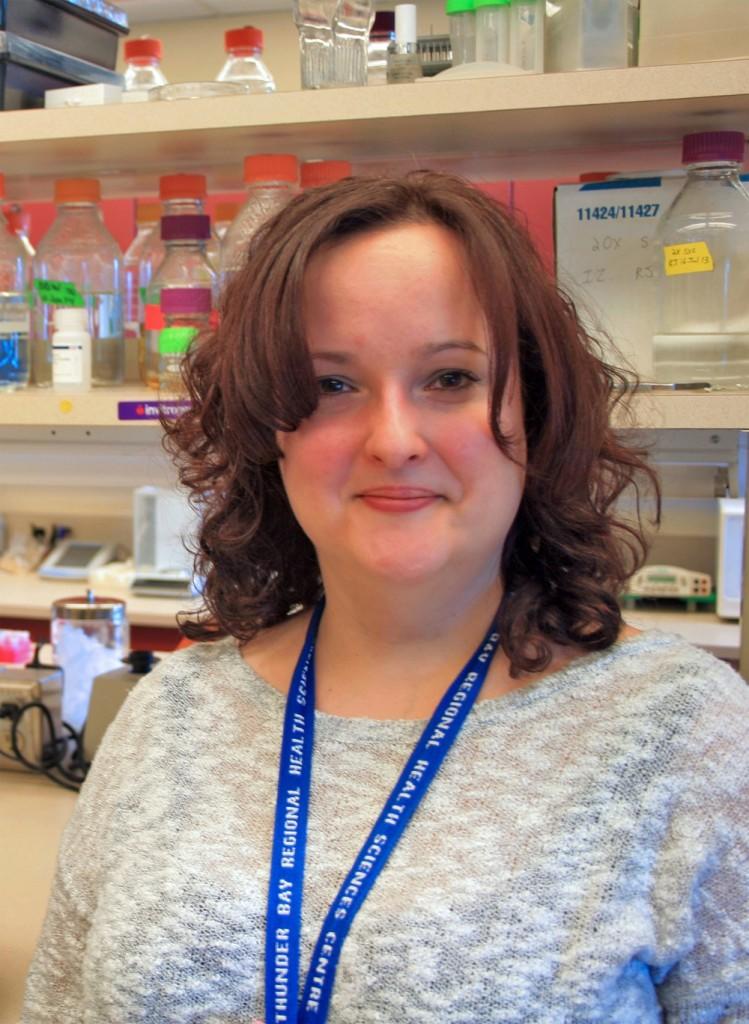Homegrown Scientist Key to Ground-Breaking Cancer Care Research
by Graham Strong

Ten years ago, Melissa Togtema would not have been able to follow her dream of becoming a research scientist while staying in Thunder Bay. But today, as a PhD student in Lakehead University’s Biotechnology program, she is doing ground-breaking cancer research at the Thunder Bay Regional Research Institute (TBRRI) that she literally could not do anywhere else in the world – and she’s grateful for the opportunity.
“I’ve been looking for a way back home for a while,” Togtema said.
Togtema, who is originally from Manitouwadge, went to the University of Toronto in 2003 to do her undergrad studies in biology and then worked at the Sunnybrook Research Institute as a research intern. There she met Dr. Laura Curiel, now research scientist at the TBRRI, who told Togtema about a Northern Ontario Heritage Fund Corporation funded internship here. Togtema came back to take that position and to get her Masters Degree from Lakehead before continuing on with her PhD.
“Melissa is our poster girl – she really is a success story,” Dr. Ingeborg Zehbe said, who teaches and mentors 10 undergraduate, Masters, and PhD students from Lakehead.
Melissa Togtema, originally from Manitouwadge, is in the Biotechnology Program at Lakehead University and researching cervical cancer at the TBRRI – one of a growing number of “homegrown” scientists.
The fact that the TBRRI and Lakehead University have smaller programs has been a huge advantage, Togtema said.
“We’re a pretty self-sufficient group,” Togtema said, explaining that they do all the things a lab manager may take care of at a bigger research facility. They also are more hands-on with other aspects of research including writing grant proposals and papers. “It’s good because then we get a whole education on what it takes to run a research program from beginning to end.”
The smaller program also means they have much more opportunity for advancement; Togtema herself has published five papers compared to students in larger programs who may only have one or two. In turn, having those publications helped her get funding for her research including a prestigious student NSERC grant.
“If we didn’t have a chance to have so many publications and have the opportunity to attend conferences to get our work out there, it would be considerably harder to win these grants,” Togtema said. “We’ve all had federal or provincial grants in this group.”
“That’s quite unusual even for top students at other programs,” Dr. Zehbe said. “I think even Harvard could not beat any of my students.”
Togtema is currently helping Dr. Zehbe in her research to find a new treatment for cervical cancer. Its two-pronged approach and unique treatment method could have applications for all HPV-related cancers – and is something unlike anything being done elsewhere in the world.
It’s all happening in a research environment that larger programs just can’t offer.
“I have a very close relationship with every student, and the students have close relationships,” Dr. Zehbe said. “I think the social aspect is very important. I believe in this kind of research enterprise like we have here at the TBRRI.”
“It’s hard to have the one-on-one with your supervisor in larger programs,” Togtema said. “Here, it makes all the difference.”
Thank you to all the people and our government and industry partners who have supported the TBRRI to make it the world class research centre it is today! You help provide students from Northwestern Ontario and all over the world with incredible learning opportunities.